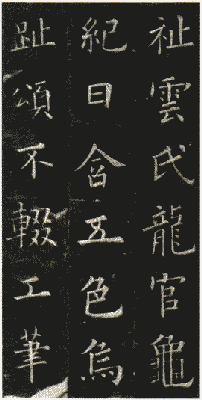| Created in China > Art Treasures > Chinese Calligraphy > Calligraphy Elites |
|
|
Ouyang Xun
Several of his kasha works were seen as the best of the Tang Dynasty. As the later generations found out, his kaishu had a certain order or formula in both its strokes and structure, which was easy for a novice to learn. As early as in the Sui Dynasty, Ouyang's calligraphy was widely known, and by the Tang Dynasty, as both the man and his calligraphy got older, had attained a high degree of perfection. However, Ouyang was not content with the achievements and continued practicing. One day, during an outing with his friends, Ouyang came upon a stele inscribed by Suo Jing (a famous calligrapher of the Jin Dynasty), and felt the inscription was really mediocre after several look at it. However, upon second thought, he believed there must be something outstanding about the stele, since Suo was hailed as a great calligrapher. With this idea in mind, He stood for a long while in front of the stele, had a careful look into it and discovered the sparkling points about it. He went on to explore the stele for another three days, and finally realized the secret of using a writing brush, hence further perfecting his calligraphy. Author: Jessie |
||||
 |
